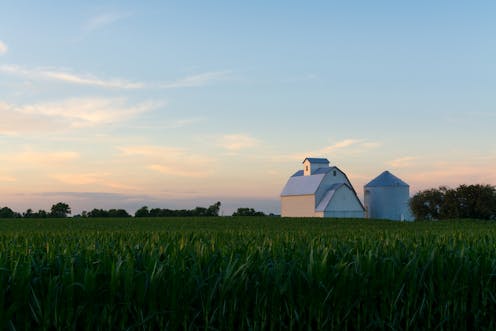Many Midwesterners will likely never believe in climate change. Here’s how to encourage them to act anyway
- Written by Matthew Houser, Assistant Research Scientist, Indiana University

The number of politically conservative Americans who are climate skeptics is growing[1], and the evidence suggests that they’re unlikely to change their opinions.
This is particularly evident in the Midwest. Although 61 percent of U.S. adults are concerned about global warming, in many Midwestern counties more than half of adults are not at all worried about the issue[2].
Efforts to meet the dire calls of the UN’s climate change report[3] cannot neglect this region. Our work shows that there are some strategies that can encourage protective climate actions, even in skeptical regions like the Midwest.
Skeptics in the Midwest
The Midwest – defined here as the states of Ohio, Michigan, Indiana, Illinois, Wisconsin, Iowa, Missouri and Minnesota – is a key contributor to climate change in the U.S.
Across the region, per-capita greenhouse gas emissions are exceptionally high[4]. The typical Midwesterner emits about 22 percent more emissions than the national individual average.
The Midwest is also threatened by the impacts of climate change[5]. Warming temperatures and rising humidity are leading to more heat waves and heavy rain. That puts additional stress on transportation and energy infrastructure, as well as introduces significant health risks. If the Midwest does not prepare for these events, energy demands and associated emissions in the region will likely increase, as will the number of deaths from climatic events[6].
Researchers have suggested a number of policies, individual actions and projects[7] that could address the Midwest’s significant contributions to and vulnerabilities to climate change. However, whether or not these actions are pursued appears to be highly tied to public attitudes toward climate change[8].
Over time, Americans have become further entrenched in their partisan view of climate change, with conservatives becoming increasingly skeptical[9]. The percentage of Republicans who believe human activity contributes to rising global temperatures declined by 10 points between 2001 and 2016, while the percentage of Democrats who believe that increased.
Midwesterners who identify as either politically conservative or Republican appear to be highly skeptical of climate change[10]. For instance, only 46 percent of Republicans in our home state, Indiana, agreed that climate change was occurring, compared to 80 percent of the Democrats.
Additionally, it would also be wrong to assume that only uneducated conservatives are climate skeptics. Rather, political orientation appears to moderate the influence of education on skepticism, meaning more educated conservatives are actually more confident in their skepticism[11].
This research suggest that attempts to change skeptics’ minds would likely fail, both in the Midwest and in the country as a whole.
Preserving, not changing
If skeptics will not accept the reality of human-caused climate change and that it’s here to stay, what can be done?
Conservatives appear to be particularly opposed to the idea that humans cause climate change[12]. Past research suggests this may be a result of conservatives’ preference for the status quo, preserving life as it is (or was). Rejecting humans’ involvement also means rejecting the need to change society and your value system[13].
This perspective may actually make conservatives particularly open to a resilience approach to climate change. Resilience focuses on implementing household or community practices that reduce vulnerability to the impacts of climate change. For instance, the risks of flash floods from heavy rain can be reduced by installing water-absorbent green infrastructure[14], like permeable pavement and rain gardens.
This approach emphasizes preserving, rather than changing, society. It can be pursued without believing that humans are causing the environmental issues. In consequence, one can argue that efforts to increase climate resilience align with conservative attitudes. Preliminary research suggests conservatives support and undertake resilience practices[15] at similarly high rates to liberals.
At Indiana University’s Environmental Resilience Institute[16], we meet regularly with mayors, county commissioners and other local officials. Our conversations with conservative leaders about climate change are often met with statements that climate change is difficult to acknowledge. But the topics of most concern listed by public officials during these meetings – flooding, business development, workforce development, crime and blighted housing – can be aligned with climate resilience strategies.
Public leaders in Indiana are conducting studies on how to reduce the impact of flash flooding[17] to protect the local economy and quality of life, converting streetlamps to LEDs[18] as a crime-prevention strategy, installing green infrastructure[19] to revitalize blighted neighborhoods and reduce runoff from heavy rains, and introducing an electric car share program[20] as a way to avoid dependence on foreign oil. These approaches are pursued to increase climate resilience, but many also decrease emissions.
Though our outreach is in still early stages, preliminary success suggests an important point: Efforts to address climate change in one of the most skeptical, conservative regions of the U.S. may be better served by focusing on preparing for environmental changes, and not on what is causing them.
References
- ^ is growing (doi.org)
- ^ are not at all worried about the issue (climatecommunication.yale.edu)
- ^ UN’s climate change report (www.nytimes.com)
- ^ per-capita greenhouse gas emissions are exceptionally high (www.iupress.indiana.edu)
- ^ threatened by the impacts of climate change (nca2014.globalchange.gov)
- ^ the number of deaths from climatic events (www.iupress.indiana.edu)
- ^ a number of policies, individual actions and projects (nca2014.globalchange.gov)
- ^ public attitudes toward climate change (doi.org)
- ^ conservatives becoming increasingly skeptical (doi.org)
- ^ highly skeptical of climate change (doi.org)
- ^ more confident in their skepticism (doi.org)
- ^ humans cause climate change (doi.org)
- ^ society and your value system (dx.doi.org)
- ^ by installing water-absorbent green infrastructure (www.epa.gov)
- ^ conservatives support and undertake resilience practices (doi.org)
- ^ Environmental Resilience Institute (eri.iu.edu)
- ^ conducting studies on how to reduce the impact of flash flooding (44news.wevv.com)
- ^ converting streetlamps to LEDs (eri.iu.edu)
- ^ installing green infrastructure (eri.iu.edu)
- ^ introducing an electric car share program (www.indy.gov)
Authors: Matthew Houser, Assistant Research Scientist, Indiana University

